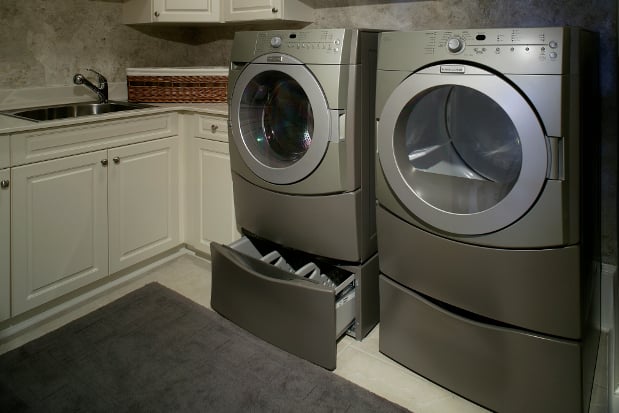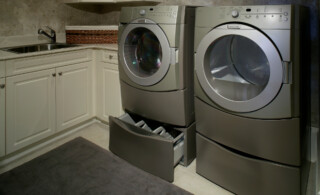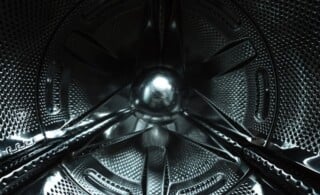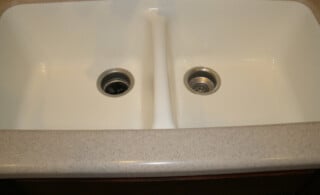
Don’t look now, but there’s been a revolution of late in the world of washers and dryers. What used to be a fairly straightforward purchase has now become a decision fraught with an overwhelming array of options and the weight of environmental responsibility. Never fear! We’re here to set the record straight on washers and dryers, and which models, options, and styles should be at the top of your list.
Washing Machines
While they sound complicated, there are really only a few basic things you need to know about washing machines when you shop. First of all, you’ll need to decide whether you want a front load model or a top loading model. Energy efficient front load models use about 2/3 of the amount of water that a cheaper, top loading washer uses to clean the same amount of clothes. Whether you’re concerned about your pocket book or the environment, investing in a front loading washer is an excellent decision. These washers do come with a higher initial price tag, but when you consider energy and water savings, that front loading washer is going to pay for itself as the years go by. Beyond the standard front vs. top load debate, look for other options that will make your life easier. Automatic temperature controls and water level controls make for a more efficient appliance, and features like automatic detergent dispensers and timers make a more efficient life for you as well.
Clothes Dryer
The other half of the washers and dryers dilemma is choosing the right dryer for your family. A dryer isn’t nearly as complicated of a machine when it comes to washers and dryers. Basically they consist of a large, heated tumbler that vents moisture out through a dryer vent as it dries your clothes. Your biggest decision here is going to be whether to choose a gas or electric model. Gas models are more expensive initially, though not exorbitantly so, and they are more efficient. Again, purchasing a gas-powered dryer is one of those investments that is going to pay for itself over the life of the machine when it comes to energy savings. Finally, look for a dryer that has either a moisture sensor or a thermostat that regulates interior temperature. These features allow the clothes dryer to gradually decrease heat and energy consumption over the course of the drying cycle. It adds years to the life of your appliance, and it is much easier on your clothes, meaning you’ll save money on both energy bills and clothes purchases over the long run.
Ready to start your Appliance Installation?
Find ProsWashing Machine Maintenance and Dryer Tips
Washers and dryers require regular maintenance to ensure they operate properly and safely. With washing machine maintenance, the best thing you can do is check the rubber hoses from time to time for any sign of wear and tear. Often, small blisters or cracks develop in the rubber, which can rupture and lead to flooding and severe water damage to your home. Most manufacturers recommend replacing the hoses every five years, whether it’s needed or not. If your hoses are more than five years old, it’s probably a good idea to call in an appliance repairman to come and switch the old hoses out.
Other washing machine maintenance chores are more spot repairs than preventative measures. Motors, switches, pulleys, timers, agitators, and a host of other parts will wear out over time. Calling in an appliance repairman to fix these washing machine maintenance problems is your best bet, especially if you need to get your washer and dryer up and running as quickly as possible, which is usually the case.
When it comes to the dryer half of your washer and dryer setup, the main thing is keeping it clean of lint and making sure your unit is well-vented. Always install aluminum or metal venting hose, never plastic, to reduce fire hazard, and have your dryer vent hose cleaned out once a year to remove lint buildup. Besides those basic maintenance tasks, there’s not much you can do except call in a repairman when more critical parts breakdown.
 Types of Stackable Washers and Dryers
Types of Stackable Washers and Dryers  Dryer Vent 101
Dryer Vent 101  What to Check When Your Washer Won’t Drain
What to Check When Your Washer Won’t Drain  DIY Guide: Replacing a Washer Pump
DIY Guide: Replacing a Washer Pump  Garbage Disposal Cleaning: Show Your Garbage Disposal Who Is Boss
Garbage Disposal Cleaning: Show Your Garbage Disposal Who Is Boss 

Are You Familiar With This Topic? Share Your Experience.